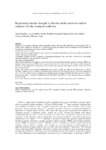Mostrar o rexistro simple do ítem
Respiratory muscle strength in chronic stroke survivors and its relation with the 6-minute walk test
| dc.contributor.author | Lista-Paz, Ana | |
| dc.contributor.author | González Doniz, Luz | |
| dc.contributor.author | Ortigueira García, Serafín | |
| dc.contributor.author | Saleta Canosa, Jesús Luis | |
| dc.contributor.author | Moreno Couto, Christian | |
| dc.date.accessioned | 2016-02-29T09:31:35Z | |
| dc.date.issued | 2016-02 | |
| dc.identifier.citation | Lista Paz A, González Doniz L, Ortigueira García S, Saleta Canosa JL, Moreno Couto C. Respiratory muscle strength in chronic stroke survivors and its relation with the 6-minute walk test. Arch Phys Med Rehab. 2016;97(2):266-272 | es_ES |
| dc.identifier.uri | http://hdl.handle.net/2183/16135 | |
| dc.description.abstract | [Abstract] Objectives. To compare respiratory muscle strength in stroke survivors (SS) with that in a control group (CG) of healthy people matched by age and sex, as well as to investigate any relation between respiratory muscle strength and the distance walked during the 6-minute walk test (6MWT). Design. Cross-sectional study. Setting. This study comprised patients from a private neurological rehabilitation center and a public association for patients with acquired brain injury. Participants. Chronic SS with a diagnosis of hemiplegia/hemiparesis who were able to walk (n=30) and healthy individuals matched by sex and age (n=30) (N=60). Interventions. Not applicable. Main Outcome Measures. Respiratory muscle strength was assessed using maximal expiratory pressure (MEP) and maximal inspiratory pressure (MIP) with a pressure transducer and a diver nozzle. The distance walked during the 6MWT was also registered for both groups. The motricity index and the Scale Impact of Stroke version 16.0 were also measured in SS. Results. The Student t test revealed significantly lower values of MIP and MEP in SS than in the CG (MEP, 95.93±43.12cmH2O in SS vs 158.43±41.6cmH2O in the CG; MIP, 58.7±24.67cmH2O in SS vs 105.7±23.14cmH2O in the CG; P<.001). Moreover, these findings were clinically relevant because both MIP and MEP in SS were <60% of the predicted values. A positive correlation between the 6MWT and MIP was found using the Pearson coefficient (r=.43; P<.018). Conclusions. Respiratory muscle weakness should be considered in a holistic approach to stroke rehabilitation. | es_ES |
| dc.language.iso | eng | es_ES |
| dc.publisher | Elsevier | es_ES |
| dc.relation.uri | http://dx.doi.org/10.1016/j.apmr.2015.10.089 | es_ES |
| dc.rights | Creative Commons Attribution-NonCommercial-NoDerivs 4.0 International Licence | es_ES |
| dc.rights.uri | http://creativecommons.org/licenses/by-nc-nd/4.0/ | |
| dc.subject | Physical therapy modalities | es_ES |
| dc.subject | Rehabilitation | es_ES |
| dc.subject | Respiratory function test | es_ES |
| dc.subject | Respiratory muscles | es_ES |
| dc.subject | Stroke | es_ES |
| dc.title | Respiratory muscle strength in chronic stroke survivors and its relation with the 6-minute walk test | es_ES |
| dc.type | info:eu-repo/semantics/article | es_ES |
| dc.rights.access | info:eu-repo/semantics/embargoedAccess | es_ES |
| dc.date.embargoEndDate | 2017-02-01 | es_ES |
| dc.date.embargoLift | 2017-02-01 |
Ficheiros no ítem
Este ítem aparece na(s) seguinte(s) colección(s)
-
GI-IPRF - Artigos [133]
-
GI-EC - Artigos [11]






